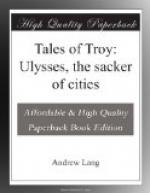Then Paris knew that he had never seen, and never could see, a lady so lovely and gracious as Helen as she sat and span, while the red drops fell and vanished from the ruby called the Star; and Helen knew that among all the princes in the world there was none so beautiful as Paris. Now some say that Paris, by art magic, put on the appearance of Menelaus, and asked Helen to come sailing with him, and that she, thinking he was her husband, followed him, and he carried her across the wide waters of Troy, away from her lord and her one beautiful little daughter, the child Hermione. And others say that the Gods carried Helen herself off to Egypt, and that they made in her likeness a beautiful ghost, out of flowers and sunset clouds, whom Paris bore to Troy, and this they did to cause war between Greeks and Trojans. Another story is that Helen and her bower maiden and her jewels were seized by force, when Menelaus was out hunting. It is only certain that Paris and Helen did cross the seas together, and that Menelaus and little Hermione were left alone in the melancholy palace beside the Eurotas. Penelope, we know for certain, made no excuses for her beautiful cousin, but hated her as the cause of her own sorrows and of the deaths of thousands of men in war, for all the Greek princes were bound by their oath to fight for Menelaus against any one who injured him and stole his wife away. But Helen was very unhappy in Troy, and blamed herself as bitterly as all the other women blamed her, and most of all OEnone, who had been the love of Paris. The men were much more kind to Helen, and were determined to fight to the death rather than lose the sight of her beauty among them.
The news of the dishonour done to Menelaus and to all the princes of Greece ran through the country like fire through a forest. East and west and south and north went the news: to kings in their castles on the hills, and beside the rivers and on cliffs above the sea. The cry came to ancient Nestor of the white beard at Pylos, Nestor who had reigned over two generations of men, who had fought against the wild folk of the hills, and remembered the strong Heracles, and Eurytus of the black bow that sang before the day of battle.
The cry came to black-bearded Agamemnon, in his strong town called “golden Mycenae,” because it was so rich; it came to the people in Thisbe, where the wild doves haunt; and it came to rocky Pytho, where is the sacred temple of Apollo and the maid who prophesies. It came to Aias, the tallest and strongest of men, in his little isle of Salamis; and to Diomede of the loud war-cry, the bravest of warriors, who held Argos and Tiryns of the black walls of huge, stones, that are still standing. The summons came to the western islands and to Ulysses in Ithaca, and even far south to the great island of Crete of the hundred cities, where Idomeneus ruled in Cnossos; Idomeneus, whose ruined palace may still be seen with the throne




